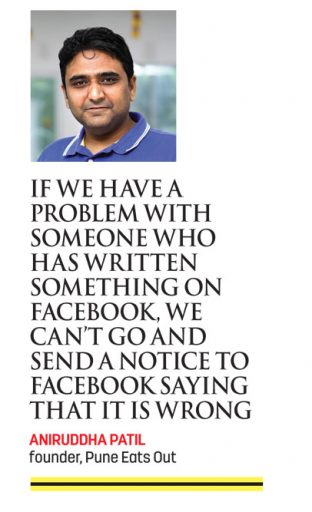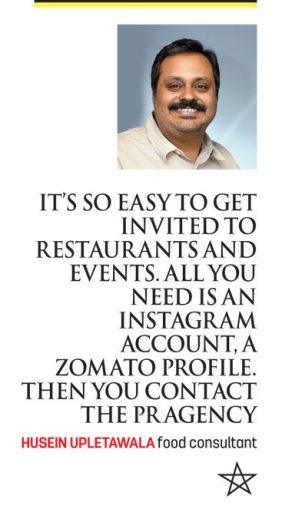Restaurant Reviews: The Fault in Their Stars
Restaurants are biting back at social media influencers who offer good reviews for a fee and free meals
 Lhendup G Bhutia
Lhendup G Bhutia
 Lhendup G Bhutia
Lhendup G Bhutia
 |
22 Nov, 2019
|
22 Nov, 2019
/wp-content/uploads/2019/11/Restaurants1.jpg)
(Illustration: Saurabh Singh)
Ratnam was then a first-time restaurateur. He had recently quit a banking job to start what would become the first of his six Chulha Kitchen Restaurant outlets, a small quick-service restaurant specialising in north Indian cuisine. He reached out to a Zomato ‘connoisseur’, the title awarded to the most popular food reviewers on the platform, who specialised in Ghaziabad, the area where Ratnam’s establishment was located (the platform allows reviewers to be deemed experts in neighbourhoods they usually frequent).
A large meal with several dishes, as agreed between the two, was sent across. “I got a call back saying even his wife was a connoisseur [on the platform] and both of them would give two individual five-star reviews [the highest one can attain on the platform],” Ratnam recalls. “All I had to do,” he told me, “was to follow the norm and pay them for it.”
“That’s where I drew the line,” he says. “I had just pooled all my finances and started this restaurant. And I wasn’t just going to go around spending money to buy paid reviews online.”
The altercation continued for a while. The phone calls kept coming. When Ratnam refused, the reviewer, he says, demanded another set of free meals. At one point, the connoisseur began to threaten him with a poor rating. By then Ratnam had begun recording their conversations. And later, submitting the recording of these conversations as proof to Zomato, he claims, he got the couple struck off the platform.
In the last three years, as Ratnam’s business has grown, from one small establishment in Ghaziabad to now a total of six outlets across Delhi, the demands in lieu of high online ratings have only got worse. “Every few days, somebody will walk in, whip out his phone, show me his follower count and ask if we can collaborate,” he says. “They want free food, a car to pick up and drop them and a fee. Three years ago, the going rate was about Rs 1,500 for one individual review. But now, because there are so many [influencers], you can get a good review for about Rs 500.”
The restaurant business is undergoing a massive churn with the emergence of online platforms and social media. Food is now fetishised and Instagrammed, restaurants are discovered and selected based on the stars they have accrued
online and, behind the scenes, even the way the business is conducted—from the deep discount establishments have to offer based on membership schemes to the amount of business that now comes in from app-based deliveries—is changing the industry.
Unsurprisingly, an army of social media influencers has begun to descend upon restaurants offering ‘exposure’, favourable reviews and ratings in return for free meals and fees.
Occasionally, there have been tiffs between restaurants and online reviewers. A few years ago, Fat Kid Deli (a restaurant, now closed, in Vashi on the eastern fringes of Mumbai), which had built something of a reputation for taking on reviewers on Zomato, told a reviewer who had complained about her burger, ‘Maybe you don’t know what wasabi is or tastes like, you should’ve read the menu clearly. First understand your own palate and then order accordingly, before calling my food pathetic. Keep your suggestions to yourself alright.’ But such spats are few and far between. Most restaurants—no matter how uncharitable or unfair the review—take it on the chin and apologise online.
But now they are biting back.
A few weeks ago, a hospitality body, the National Union of Hospitality Industry of India (NUHII), sent a legal notice to a popular Facebook group of online food reviewers in Mumbai.
“[Online blogging/reviewing] has become so negative,” says Sanee Awsarmmel, the NUHII chairperson. “People with no experience in hospitality or food reviewing call themselves influencers and food bloggers because they have some [online] followers. And then they gang up against restaurants and extort money for reviews.”
“Food blogging might have been good for the industry 10 years back,” he says. “But now restaurants are terrified of them. Don’t agree to their demands and you get a bad rating.”
ACCORDING TO Awsarmmel, they will now begin to lodge police complaints for extortion against influencers who make such demands. The NUHII is also demanding the establishment of a certifying agency, comprising restaurateurs and members of hospitality bodies along with government bodies, such as the Food and Drug Administration and the Food Safety and Standards Authority of India, for food bloggers and influencers.
“I’m not against the freedom of expression of diners who want to talk genuinely about their food experiences. But the way it is going on now, where this argument is being used to support a way of extorting money and free meals, cannot be allowed,” says Awsarmmel.
Aniruddha Patil, the founder of the Facebook group Pune Eats Out (PEO), which was served with the legal notice, draws a distinction between an individual who expresses an opinion and the platform where that opinion is published. “If we have a problem with someone who has written something on Facebook, we can’t go and send a notice to Facebook saying that it is wrong,” he says when asked about the complaint against the group.
Patil is a popular figure in Pune’s restaurant scene. The PEO, he explains, started out as a small community page on Orkut for people in Pune to connect over food. But it is now a thriving community of over 150,000 members. People share their experiences at restaurants on the platform and meet over food events. Patil has also launched a membership programme, the PEO Privilege Programme, where for a fee one can get deals and discounts at restaurants.
According to Patil, unlike other platforms, there is a level of trust in the PEO. “There are no fake profiles here. And when someone writes about their experiences about a meal, it is always about sharing an experience. Not a verdict,” he says. “And whenever someone writes about something that went wrong, at least 99 per cent of the time, the owners [many of whom are also on the group] will always respond to learn what went wrong.”

“There are issues in [food blogging], but that’s like any other business and we all have to work together to make things better,” he says.
The stranglehold of the rating culture on the way we dine has to a large extent been brought about by Zomato. The restaurant aggregator controls everything here, from the way we discover new restaurants to the way we choose among them. It nudges us to rate and review restaurants by bestowing, as we rack up the review count, titles and our own ranks and the influence that comes along with it. A first-time reviewer might have a minimal impact on an establishment’s rating. But as one rises up the levels, from an ordinary ‘foodie’ to a ‘big foodie’, ‘super Foodie’ and, finally, the connoisseur, the weight of one’s reviews and ratings also rise.
A restaurant bent on improving its rating on Zomato can simply do so by targeting connoisseurs for positive reviews.
According to Ratnam, most restaurants with over four stars on the platform would have acquired their ratings not based on the quality of their meals but by either paying connoisseurs or offering them freebies. “Without it, I don’t see how you can legitimately have anything above four [stars],” he says.
Most reviewers who want to become connoisseurs, restaurateurs point out, do so by bombarding the platform with reviews. Often, they lift online images of meals, sometimes even reviews elsewhere and publish them under their names on the platform. “I have one person in the restaurant whose job is simply to look up what’s happening online to see if something fishy has happened,” says Pankaj Gupta, the owner of Taftoon Bar and Kitchen in Mumbai’s business district, the Bandra-Kurla Complex. According to him, these will often be photos of meals that aren’t even available at the restaurant. “We scan and present CCTV footage of the restaurant sometimes to show Zomato that some of the reviewers [whose feedback has recently come up] haven’t even been to the restaurant,” he says.
A Zomato spokesperson tells Open they are currently in the process of doing away with their food-reviewing levels. The titles have already been removed from the mobile app, the spokesperson says, and they will soon be removed from the website too. According to her, this has nothing to do with complaints about soliciting money, or restaurants and connoisseurs coming together to bump up an establishment’s ratings. “We are just coming up with a newer version, a new engagement tool for users,” the spokesperson says over the phone.
Food is now fetishised and Instagrammed, restaurants are discovered and selected based on the stars they have accrued online. Unsurprisingly, an army of social media influencers have begun to descend upon restaurants offering ‘exposure’, favorable reviews and ratings in return for food and money
‘Neutrality is at the heart of Zomato,’ the spokesperson says. ‘Both technology and a seasoned team work on it every moment to identify any suspicious behaviour and constantly flag any irregularities. Project Clampdown is an example of our zero tolerance towards any bad actors in the system where we warn users about any suspicious activity by a restaurant and also allow partners to report dubious reviews for us to identify users practising solicitation, respectively.’
This clampdown, brought about earlier this year, after the platform apparently removed over 300 high-activity users who were soliciting favourable reviews, tries to tackle this issue by turning reviewers into vigilantes, providing them with credit points for reporting any soliciting by restaurants and putting up banners that state suspicious activity detected when they find such instances on these restaurants’ pages.
UT A LARGE part of this soliciting now doesn’t happen simply between restaurants and influencers but through ‘food consultants’ or ‘agencies’. These are former food bloggers and influencers with a vast network of influencers who, for a fee, promise a certain number of reviews on the platform and promotions on social media platforms. A Mumbai-based restaurateur who requests anonymity says consultants promise a high number of reviews or promotion through influencers for a fee. “They will ask for Rs 30,000-40,000 upfront. And say, I will make your Zomato account go from 4.5 stars to 4.9. But I don’t believe in that. A rating doesn’t change a restaurant’s destiny. Just look at all these restaurants which had managed 4.5 stars or above and 70 per cent of them have shut in Mumbai over the last few years,” the restaurateur says.
“It’s a murky space,” says Aakanksha Gupta, the founder of The Other Circle, a PR agency with restaurants on its client list. “With the increasing number of influencers today, many consultants ask for commercials [promotions on social media platforms for a fee], which may or may not be fruitful for the brand.” The business of restaurant promotion, according to Aakanksha, has changed rapidly. And tapping influencers is a crucial aspect of it. “One has to be very selective when shortlisting influencers though,” she says. “You have to not just look at follower counts but also engagement levels [within the influencer’s account], to weed out those who might have purchased followers but whose poor engagement levels give it away. You can’t drop your standards.”
At Taftoon Bar and Kitchen, Pankaj occasionally does invite selected influencers when new menus or events have to be promoted. But no money, he says, is ever exchanged; nor influencers’ requests outside those events entertained. But that doesn’t stop them from asking for freebies. “Just a few months ago, a family of four enjoyed a large meal. And when the bill arrived, they showed their follower counts on social media and asked for a 40 per cent discount,” he says. “It becomes so embarrassing for everyone. Of course, we don’t agree and sometimes they threaten us with bad reviews.”

Husein Upletawala, a food consultant and Zomato connoisseur who was a popular food blogger in the past, points out that to some extent PR agencies are to blame for the monster they have created. “It’s so easy to get invited to restaurants and events. All you need is an Instagram account, a Zomato profile. Then you contact the PR agency. Tell them these are my social media [accounts and followings] and you are in. There is very little discretion,” he says.
Upletawala, who stopped reviewing meals for his blog two years ago and very occasionally posts on Zomato now because he got into the hospitality industry himself—and he believes there is a conflict of interest there—agrees that there is a lot of disorder in this field now. “You see a lot of youngsters—IT professionals, students, doctors and the like—who don’t have any real knowledge of food and look at [food blogging] as a form of supplementary income. If restaurants are getting [promotions] from it, [influencers] see it [as a case of] why they too shouldn’t get something in return.”
Ratnam, despite his dislike for food influencers, does occasionally give in to their demands. When it is possible, he says, he provides discounts but refrains from paying them.
And what happened to the couple he had complained against?
Ratnam laughs loudly. “They have become competitors now. They have opened a small outlet of their own,” he says. “I guess they realised there isn’t much of a future in [working as food influencers] after a point.”

/wp-content/uploads/2025/07/Cover-Shubman-Gill-1.jpg)












More Columns
Shubhanshu Shukla Return Date Set For July 14 Open
Rhythm Streets Aditya Mani Jha
Mumbai’s Glazed Memories Shaikh Ayaz